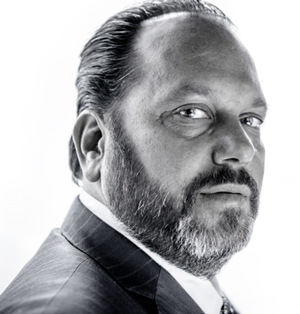Trending
The Closing: Andrew Heiberger
The Town Residential founder on his lack of corporate training, his multimillion sale of Citi Habitats, and his upcoming nuptials

Andrew Heiberger [TRDataCustom] is the founder and CEO of the Manhattan-based residential brokerage Town Residential, which he launched in 2010. He sold his previous company, Citi Habitats, to competitor NRT Incorporated for $49.6 million in 2004. Before starting Town, Heiberger was a developer with the boutique firm Buttonwood Real Estate and converted such buildings as 88 Greenwich Street, a 37-story office tower in the Financial District, and One Rector Park, a 174-unit rental property in Battery Park City, into condominiums. Heiberger recently bought his former partner, Joseph Sitt of Thor Equities, out of his stake in Town for an undisclosed sum, making Heiberger the sole owner of the approximately 500-agent company. The two had a long, contentious relationship marked by dueling lawsuits over the company’s finances.
DOB: January 18, 1968
Hometown: Dix Hills, Long Island
Lives in: Tribeca
Family: Engaged to second wife; two children
What was your childhood like?
I was a good kid. I grew up in an upper-middle-class neighborhood. I have a brother and a sister, five and seven years older than me.
What did your parents do?
My father built luxury homes on Long Island dating back to the late 1980s. He built LL Cool J’s first house when he came out with the “Walking with a Panther” album. Back then, his name was James Todd Smith and he’d just won his first Grammy. My mom is still working as a real estate broker at Douglas Elliman in Dix Hills. She refuses to retire.
How did you get your start in the business?
My first job was renting apartments for Steve Croman. I believe the first rental I ever did was at Red Square on Houston Street.
Croman was recently arrested for alleged tenant harassment. What do you make of that?
I feel bad because I think he’s one of the hardest workers. He was always the first in the office. It appears as if he might have gotten ahead of himself.
What were you like as a young broker?
I never had any written plans or long views. My business plan, if there was one, was to earn as much money on a week-to-week basis as I could.
How did you start Citi Habitats?
My original partner and investor was my childhood friend Igal Feibush. I traded 50 percent of the business to him for $43,000. Back then I didn’t understand the gravity of that. I was under the impression that we were going to contribute to the company equally. After our fifth year, I bought him out and he moved to California.
 Were you prepared to run a company?
Were you prepared to run a company?
I learned as I went. I didn’t realize how big the company was until 2000-ish, when Howard Lorber and Dottie Herman approached us when they were looking to expand into NYC with their Prudential brand. I had no idea until that moment that I was sitting on a multimillion-dollar company.
How did you feel about the sale of the company in 2004?
It was surreal. I was 36. I never imagined I would own a company that some major corporation was interested in.
What did you do with all that money?
There’s a whole system in place when you come into money, and there are all kinds of things that start presenting themselves to you: top restaurateurs wooing you to eat at their restaurants, car dealers trying to sell you nicer cars, high-end tailors trying to sell you expensive suits, brokers trying to sell you a bigger apartment.
What’s the most lavish thing you ever purchased?
My house in Southampton. I bought the land and I built it. But I later sold it for $16.3 million.
Did you ever buy something and then think, “Oh gosh, why did I buy that?”
All of it.
What’s the downside of that new wealth?
You don’t know who to trust.
After you sold Citi Habitats, you jumped into development. How’d that go?
I converted 88 Greenwich with 452 units. I remember driving through the city with my parents and saying, “I’m going to buy this building.” Their jaws dropped. I was 50-50 partners with Joe Sitt. He was a young dynamo. Developers like Ziel Feldman also wanted me to go in with them to buy it, but Joe was the most aggressive.
What made you start Town?
In 2008, when the market crashed, development, as I knew it, was dead. My noncompete had expired, so I decided that I would go back into brokerage and do something different this time.
Are you worried that your legal battle with Joe made you seem litigious?
I’m very worried about that stigma. It’s not what I am. I actually think people thought the opposite about me — that I wouldn’t defend the company, that it was a weakness of mine. The official dispute with Sitt only lasted for six weeks. Yet for some reason, that one six-week dispute has overshadowed the $12 billion in transactions we’ve done.
You have a new investor now. Who is it?
I’ve decided that I’m not going to disclose my new investor.
How much did you pay Joe for his stake?
Many, many, many millions. Three manys.
What’s your marital status?
I’m engaged. My fiancée’s name is Haley Lancau. She’s 17 years younger. We met Downtown at the Dream hotel. I just said hello and there was a spark. Haley went to fashion school. She’s a designer, so I deputized her with the responsibility of freshening up Town’s offices. We’re getting married this August in Watch Hill, Rhode Island.
What’s your wedding going to be like?
If she was in charge, it would be small and intimate. It will be a traditional Jewish wedding.
What’s the most romantic thing you’ve ever done for her?
I proposed to her with my children there. My children were involved in every part of the decision.
Your ex-wife, Robyn, used to be a broker at Town….
I don’t like referring to her as my ex-wife. I tell people she’s one of my best friends. We made a mature decision about our marriage, and I think we were both in agreement about it.
Does she still work at Town?
Robyn just got her real estate license activated again, but I wouldn’t say that she’s really working [joking]. She never really worked. But she has a good eye for design.




